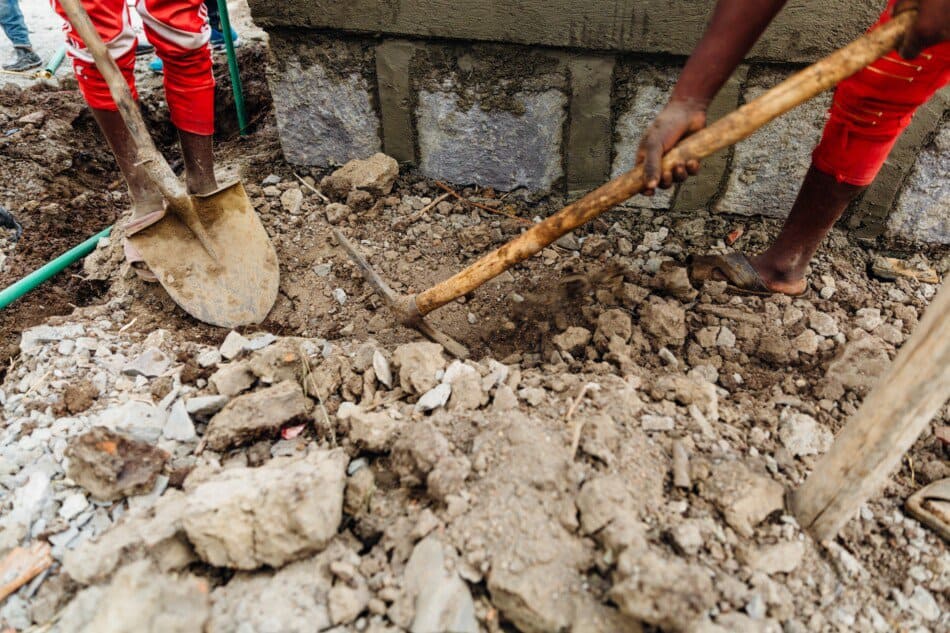Where to put your new pool is a huge deal and will define the aesthetics of your backyard. Some homeowners have to deal with various easements on their property like utility easements or express easements. Answering the question, “Can I put an above ground pool on an easement?” is slightly complicated but also usually answered by applying common sense.
Depending on the type of easement it is possible for you to put an above-ground pool on an easement but it is most likely an unwise choice. Since above-ground pools wouldn’t be considered permanent structures it’s not illegal to do so but the pool owner would run the risk of needing to tear down their pool. For example, the electric company needs to repair the electric line that runs below your above-ground pool. While this case is rare, it could happen.
I’m going to discuss a few more questions regarding whether you can put an above ground pool on an easement that will apply to both above-ground pools and inground pools. But, generally, this is really a common sense sort of question so it is best to use your best judgment. There are specifics though for some properties that can really only be answered directly by experts and during permit approval. This begs a different question, do above ground pools need a permit?
Can You Put a Pool on a Property Easement?
An inground pool should not be put on an easement as this is a permanent structure. There are also various easements to consider but for example, one of the first things that need to be done during the initial phase of purchasing an inground pool will be calling a company that handles safe site utility services to come and assess the utilities that run under your yard. If you are looking to build over an electrical easement that runs under your yard, that will be an immediate “no-go” and you’ll have to reposition your pool or pay thousands upon thousands of dollars to have the electrical line moved.
Above-ground pools as mentioned before are not permanent, you could literally destroy and take down an above-ground pool in a matter of hours. But, be wary of what easements are on your property and if you run the risk of needing to take down that above-ground pool should something occur.
Can You Put a Pool on a Utility Easement?
An above-ground pool could go over a utility easement but should something occur you could look at needing to tear down your pool to give access or be forced to move it completely. Inground pools aren’t going to be able to go over utility easements. Because of the depth of an inground pool, you’ll be digging into the utility laying below which is going to make building your pool there an impossibility.
How Close Can I Put a Pool Next to an Easement?
This is a tough question to answer and is going to take a bit of common sense. Building the actual pool is just one part of the build you’ll need to think about but also the decking that will go around your pool. Whether it is above ground or inground. To be safe, if your decking is going to go over a utility easement you should consider moving the utility or repositioning your pool. It’s best to have the actual pool builder inspect your yard and the location of the easement identified by a safe site utility service to come up with the best solution.
An important thing to consider is some easements are for access and pools require a fence. This means if you build a pool and then build a fence to legally protect your pool but you illegally cut off the easement you might find yourself with some serious issues. These are all a bit complex and specific to each case individually so it is best to consult a professional and a lawyer if you find yourself in a situation as described above.
Can You Build a Pool over a Building Line?
No, you can’t build your pool over a building line. That’s exactly why they have the building line so that you can’t build beyond it. All of this gets sorted out though when you apply for permits for your pool but it’s best to identify the ideal place to put your pool beforehand. It would be a shame to sign a contract but have the construction stopped before it even begins as you would need to move the location of your pool which would most likely change the terms of your contract with your pool builder regarding costs.
Conclusion
Easements in general are specific to each piece of property. You are working with specific requirements for pools and the easements which makes a generalization for each case impossible except for certain examples like building an above ground pool over a utility easement, which is perfectly fine but does pose some risks. The best thing to do is start by calling a safe site utility service to assess your utility easements and give access to your land plot to your pool builder to view any possible issues.

